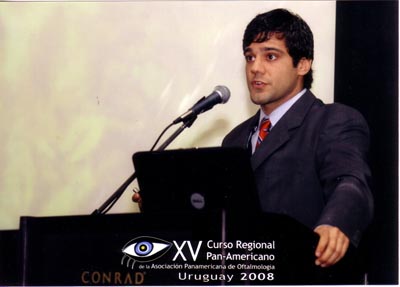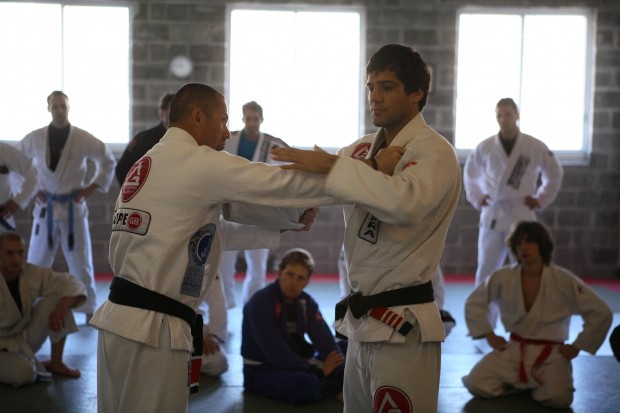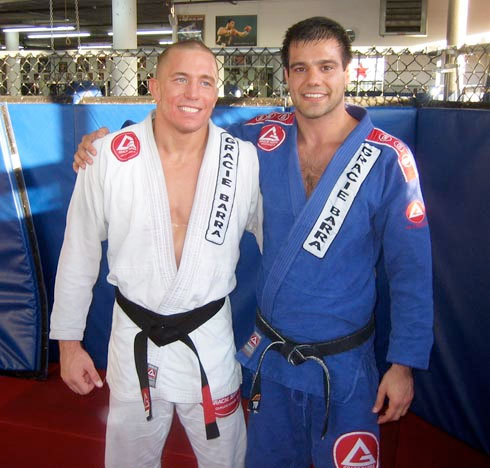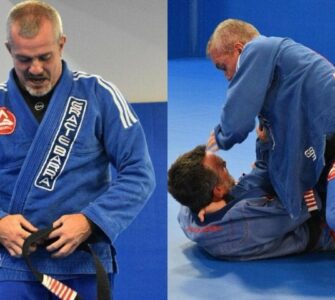Bruno Fernandes is the head instructor at Gracie Barra Montreal, has a PhD, and is an assistant professor at one of the most prestigious medical schools in Canada (McGill University), speaks four languages, BJJ coach of former UFC champion George St. Pierre, and still finds time to travel the world for surfing.
A great example for the students, he takes the Jiu-Jitsu lifestyle very seriously. Check out his interview with Gracie Barra Brazil (translated from Portuguese)
How was your first contact with Jiu-Jitsu?
I was 11 when I started. I was introduced to Jiu Jitsu by some of my father’s friends who were already black belts from Carlson Gracie. He took me to the site of the old school in Copacabana. After I saw the class, I was ready to begin. I was not really sure what I was getting myself into, but I liked it from the start.
You started with Carlson Gracie, but changed the Gracie Barra. Why this decision? What do you love at Gracie Barra?
I trained with Carlson of 11 to 16 years, where I got my blue belt. We had a strong team of children, and the training was incredibly difficult. I have only good memories of that time and all my previous training partners are still good friends. I changed my gym because my family moved to Barra and it became impossible for me to commute daily to Copacabana.
Conveniently, my new house was only two blocks from the registered office of the Gracie Barra and therefore would not make any sense to train anywhere else. The funny thing was that the Carlson Gracie and the Gracie Barra were the two strongest teams of that era and the rivalry was intense of course. The Master Carlson Gracie started a little when I told him I was going to train at Gracie Barra, but he understood that it was the best for me. I’ll never forget how nervous I was when I had to break the news. Those who knew him know what I mean.
The thing I loved most about those times training at Gracie Barra is you get used to doing everything together, and not just train Jiu Jitsu.
We liked to go to the beach, surfing, holidays, travel, always with the whole group. The gym was a meeting point, a place that I met all my best friends at the same time and of course, trained every day. Only now I realize how lucky to have had this opportunity.

What led you to go to Canada?
In 2005, after I finished my masters in Ophthalmology, I enrolled in a doctoral program that had an agreement with McGill University, which is one of the 5 best universities in the world. The original plan was to come to Montreal to do the necessary research for my thesis and return to Rio and start practicing. But all plans changed when I was invited to stay. I studied a few years and in 2009 was appointed Assistant Professor in the Departments of Ophthalmology and Pathology, which was a great honor. At that moment I realized that Montreal would be my home and opening a Gracie Barra school here was a natural step.
Talk about you accomplishments, both in Jiu Jitsu competition, as well as your academic achievements.
I always liked to compete. I would not miss a single tournament from the World Cup to a local tournament in our neighborhood, I always marked my presence. I liked the idea of testing myself and the way I found was to stay focused and train more. I won five world titles, some Pan American, Brazilian, and so on. . I was part of the team of heavyweight black belt. Being on a team with other legends from GB beside me is something that has always made me very proud.
When I moved to Canada, I had to focus on my career, so I stopped competing. I earned my doctorate, and in 2009 was appointed Assistant Professor. Even being a trained ophthalmologist, I currently work as a researcher. We manage a busy schedule at McGill University, with about 20 students from different levels in the careers lab. I have the opportunity to travel regularly to meetings and publish articles in scientific journals. Another good thing about being a researcher is that my schedule is very flexible, allowing me to spend some of my time on the mat.
Tell us about the growth of Gracie Barra in Canada? Is Jiu Jitsu is becoming part of the culture?
The number of schools Gracie Barra in Canada is still very small compared to the U.S.. However, this scenario is changing fast as the first generation of black belts is starting to produce seeds. We already have schools in all major cities of the country and we hope to double in a few years. When I arrived in 2005, few people practiced traditional Jiu-Jitsu with the Kimono. Of course everyone knew what it was and MMA (Mixed Martial Arts) was already popular, but the culture and lifestyle of Jiu-Jitsu was unknown to most people. The idea that the fighters had about Jiu-Jitsu was limited, just a way to apply some presentations and control the opponent on the ground. But fortunately, Gracie Barra is well represented here we are gradually leaving our students understand that Jiu Jitsu can have a much greater influence in their lives.

Do you ever find yourself overwhelmed by your responsibilities? If yes, how do you manage to cope with stress? What do you tell yourself?
I learned something a while ago that I always tell myself during these times: the only way to be sure that you are moving forward is to face challenges and overcome obstacles in life. So when I’m really stressed, I know I need to go through it to make me a better person and the future book something good for me.
Tell us about working with George St. Pierre. What distinguishes him from all others?
Discipline. I do not think people understand the athlete that he is. He is capable of supporting a training intensity like no other athlete could, in any sport. And he could only have gotten to this point, after years of physical conditioning, and search in improving his skills. He is able to repeat the same technique for hours, until it is executed correctly. I always use him as an example, when I see my white belts stop practicing a new move after only a few times.
What are your future goals personally (on and off the mat) as well as for your students and your school?
My focus is now 100% on my school and growing the GB community in Canada. My goal as a teacher is to have a world champion out of our school, but I know that to achieve this, I have a long road ahead. I’m glad that my students are also committed to helping us build a strong team, so I’m confident it will be just a matter of time.
What advice would you give to a student of Gracie Barra who is getting frustrated on their journey as a black belt?
The journey to black belt is long and becomes frustrating if you do not have a little fun along the way. It is not a matter of how hard you try, but how long you will be able to persist. Write Jiu Jitsu as part of your life and you will reach the highest rank without even realizing it. The only thing that changes when you get to black belt is that you stop worrying about it, then adopt this mindset now, regardless of what belt you expect.

















